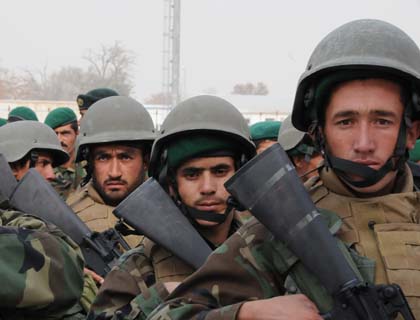There are few weeks to the NATO Summit in Chicago from May 20 to 21. The alliance's involvement in Afghanistan beyond 2014 would be on top of the Summit's agenda. A concrete strategic plan of NATO's engagement in Afghanistan after 2014 and decisions on commitment to maintain and support Afghan National Security Forces are expected.
Last week, NATO's 28 foreign ministers and 22 ISAF nations held a ministerial meeting on April 19 in Brussels prior to the Chicago Summit. Afghan Defense and Interior ministers also participated. The conference focused on security transition from the US/NATO troops to Afghan forces, assessment of political affairs and funding of Afghan National Security Forces (ANSF) after withdrawal and strength of ANSF.
NATO Secretary General Mr. Fogh Rasmussen before the conference said the coming Chicago Summit "will set out how we will make sure the transition to Afghan security responsibility succeeds by the end of 2014—and how we will support Afghanistan once transition is completed. For NATO, that will mean approving a concrete and concerted plan for managing the final stages of transition, as the main focus of our efforts shifts from combat to training, advice and assistance. And it will mean approving a plan for our engagement after the end of transition in 2014.
For the international community, it will mean setting out how to support once transition is complete. That will include funding sustainable and sufficient Afghan security forces. NATO and our ISAF partners will carry out fair share of that burden. But of course, this is a commitment for the whole international community. We must make sure we maintain the gains made with so much investment in lives and resources and even in tough times. Supporting the Afghan forces is a good deal in financial and political terms."
The funding of ANSF and continuation of aid to Afghanistan has been the agenda of discussions among the US and NATO countries' officials who want to come up with a concrete strategy based on clear commitment by all members of the alliance before the Chicago Summit. The size of ANSF is projected to reach 352,000 before October, of which 195,000 has already been completed.
However, due to the global financial crisis and lack of interest in Western capitals about Afghanistan, the US and its NATO allies are considering a plan to downsize ANSF to 230,000, reducing a third of it starting gradually from 2015 to 2017.
Maintaining the reduced size of ANSF has an estimated $4.2 billion annual cost. The United States is urging its NATO allies to contribute about 1 billion Euros to this, while Washington would channel about $3 billion. But among NATO allies, only Britain has pledged $110million annually. It is expected that Afghanistan add about $500 million to $1 billion to the annual cost of its security forces.
It is estimated that maintaining the current strength of ANSF will cost annually about $10 billion, which the US and its NATO allies have clearly said is beyond their commitment.
However, Afghan security officials have been critical of the Obama Administration's plan to heavily downsize the ANSF. Afghan officials say the plans to reduce the size of ANSF is a conceptual model based on certain assumptions such as improved security and a possible deal with insurgents for a political settlement.
Afghan officials have bigger hopes from the US and its NATO allies. In last week's NATO conference in Brussels, they were expecting a joint statement pledging commitment for continuation of aid to Afghanistan beyond 2014, which did not happen. They also expect concrete plans of continued support to ANSF and, improving the capability of Afghan National Army regarding access to modern equipment and a proper Air Force that enables it to fight domestic and foreign security threats.
Officials from Afghan Defense and Interior ministries say the decrease of ANSF strength should be based on ground realities and conditions of improved security. Recently Defense and Interior ministers urged the US Defense Secretary Leon Panetta in Washington to ensure that maintaining security takes precedence over cutting costs in determining US support for ANSF.
They were urging a revision of the plan to reduce strength of Afghan forces. It seems the Obama Administration has principally decided with the downsizing of ANSF. White House and Pentagon statements include words like "sufficient and sustainable" for strength of ANSF.
Some Republicans and Democrats have criticized the ANSF downsizing plan. Senator John McCain during a recent talk at the Carnegie Endowment for International Peace questioned the Obama Administration's plan saying "the rationale offered is that the larger number is a surge force, and it can be drawn down to the lower number in a matter of years after 2014.
That is a hard argument to swallow from a military standpoint, and the Afghan defense minister has been critical of it in those terms. Furthermore, how can it make sense to begin laying off 120,000 well-trained Afghan combat veterans in 2014 and sending them into what will surely be a dim job market?"
Recently Chairman of the Senate Armed Services Committee Senator Carl Levin questioned General John Allen, the top American commander in Afghanistan about the planned reduction in strengthen of ANSF.
Meanwhile, Senators Carl Levin, John McCain, Joe Lieberman, Lindsey Graham in a letter to President Obama have asked him to reject the plan of downsizing ANSF saying it is "premature and militarily unjustified". They say it is a wrong approach for determining the future size of the Afghan security forces.
After the withdrawal of bulk of US troops by 2014, the cost of war in Afghanistan will be reduced heavily, and the Obama Administration's plan to cut strength of ANSF does not make sense, given the fact that talks with Taliban is the only assumption for improved security justifying a move that can not only derail the hard-won achievements of the US and its NATO allies in Afghanistan during the last decade, but risk Afghanistan's decent into chaos; becoming home to international terrorists once again.

